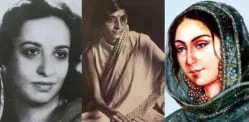Introduction
The Partition of India in 1947 remains one of the most traumatic events in South Asian history, marked by unprecedented violence and mass displacements. While historical narratives often focus on political and military aspects, the female perspective of Partition reveals profound stories of courage, resilience, and suffering. This essay explores the experiences of women during this turbulent period, highlighting their roles, struggles, and contributions.
Table of Contents
Forced Migration and Displacement
The Partition led to the largest mass migration in human history, with millions of people crossing borders to join the newly formed nations of India and Pakistan. For women, this journey was fraught with unique challenges. Many women were forced to leave their homes, often without their families or personal belongings. The chaos of migration exposed them to extreme vulnerabilities, including violence and exploitation. Women’s stories from this period reveal a deep sense of loss and displacement, as they were uprooted from their familiar surroundings and thrust into uncertain futures.
Violence and Trauma
One of the most harrowing aspects of Partition for women was the violence they endured. Reports from the time recount instances of abduction, rape, and forced conversions. Women were frequently targets of communal violence, and their suffering was compounded by the breakdown of social and legal structures. Many women who survived these atrocities were left with deep psychological scars and a profound sense of betrayal. Their trauma was often compounded by the societal stigma attached to their experiences, leaving them isolated and marginalized.
Stories of Resistance and Resilience
Despite the immense challenges, women played crucial roles in resisting and surviving the violence of Partition. Many women actively participated in relief efforts, providing support and care to those affected by the turmoil. Organizations such as the Women’s Relief Committee were established to aid displaced persons and address the needs of women and children. These efforts were instrumental in mitigating some of the immediate impacts of the crisis and providing a semblance of stability amidst the chaos.
Role of Women in Post-Partition Societies
In the aftermath of Partition, women faced the daunting task of rebuilding their lives and communities. In many cases, women had to assume new roles within their families and societies, often becoming the primary breadwinners and caretakers. Their resilience in the face of adversity was pivotal in the reconstruction of their communities. Women’s involvement in education, healthcare, and social reform became essential in shaping the post-Partition societies in both India and Pakistan.
Historical and Cultural Legacy
The experiences of women during Partition have left a lasting impact on the historical and cultural narratives of South Asia. Literature, film, and oral histories have increasingly focused on these female perspectives, offering a more nuanced understanding of the period. Works such as Khushwant Singh’s Train to Pakistan and Urvashi Butalia’s The Other Side of Silence provide invaluable insights into the lives of women during this era. These accounts not only honor the memories of those who suffered but also serve as a testament to the strength and resilience of women in the face of adversity.
Contemporary Reflections
Today, the legacy of Partition continues to influence discussions about gender and identity in South Asia. The stories of women from this period highlight ongoing issues related to gender-based violence and discrimination. By acknowledging and addressing the historical injustices faced by women, there is an opportunity to foster greater understanding and support for gender equality. The experiences of women during Partition offer important lessons for contemporary society, emphasizing the need for empathy, justice, and solidarity.
Conclusion
The female side of Partition is a poignant reminder of the resilience and strength of women in times of crisis. Their experiences, marked by both suffering and courage, provide a vital perspective on this significant historical event. By exploring and honoring their stories, we gain a deeper understanding of the impact of Partition on individuals and communities. It is essential to continue acknowledging and addressing the historical and contemporary challenges faced by women, ensuring that their voices and experiences are recognized and valued in our collective memory.










